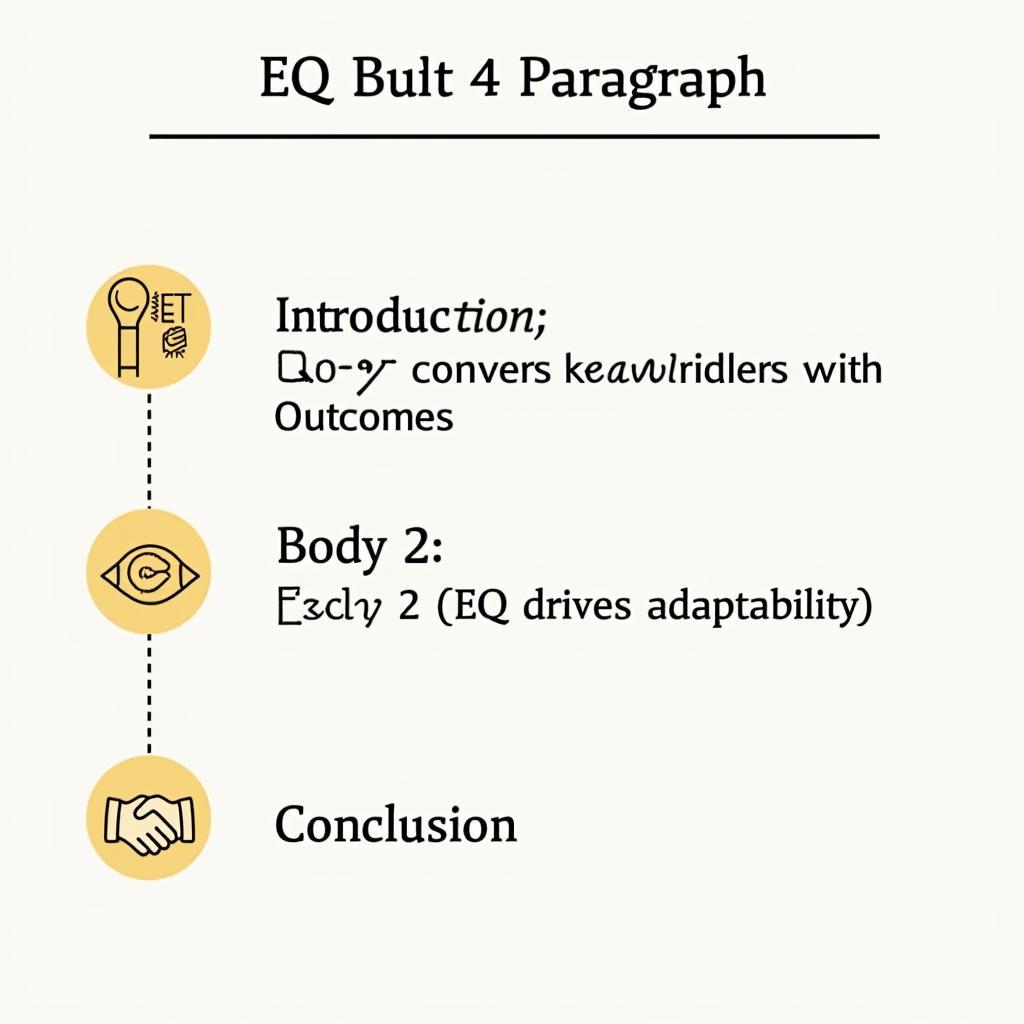Mở bài
Trong 20+ năm giảng dạy, tôi nhận thấy chủ đề Role Of Emotional Intelligence In Workplace Success (vai trò của trí tuệ cảm xúc trong thành công nơi làm việc) xuất hiện ngày càng thường xuyên trong IELTS Writing Task 2. Đây là chủ đề “hot” vì nhà tuyển dụng đánh giá cao EQ, kỹ năng mềm và khả năng hợp tác – những yếu tố ngày càng định đoạt hiệu quả công việc. Bài viết này sẽ giúp bạn: làm chủ 3 bài mẫu hoàn chỉnh (Band 8-9, 6.5-7, 5-6), phân tích chấm điểm theo 4 tiêu chí chính thức, học bộ từ vựng – cấu trúc ăn điểm cao, và áp dụng checklist tự đánh giá trước-khi-sau khi viết.
Một số đề thi/đề tham khảo đáng tin cậy (tham khảo từ IELTS Liz – Work/Employment topics; IELTS-Blog – Recent exam topics; British Council/IDP – sample prompts về employability skills):
- Some people argue that emotional intelligence is more important than technical skills for success at work. To what extent do you agree or disagree?
- Interpersonal and communication skills are becoming more important than academic qualifications in many jobs. Discuss both views and give your own opinion.
- Some people think soft skills such as teamwork and empathy determine career progression more than IQ. Do you agree or disagree?
Bạn sẽ thấy cách phân tích đề, triển khai luận điểm, tránh lỗi phổ biến của học viên Việt Nam (mạo từ, thì, giới từ), cùng phương pháp luyện tập thực tế. [internal_link: Cách viết Introduction IELTS Task 2]
1. Đề Writing Part 2
In the workplace, some people argue that emotional intelligence (EQ) is as important as, or even more important than, technical skills for career success. To what extent do you agree or disagree?
Dịch đề: Trong môi trường làm việc, có ý kiến cho rằng trí tuệ cảm xúc (EQ) quan trọng ngang, thậm chí hơn cả kỹ năng chuyên môn đối với thành công trong sự nghiệp. Bạn đồng ý hay không đồng ý ở mức độ nào?
Phân tích đề bài:
- Dạng câu hỏi: Opinion (To what extent do you agree or disagree?). Bạn cần nêu rõ lập trường và mức độ đồng ý/không đồng ý, sau đó phát triển 2-3 luận điểm chính có ví dụ.
- Thuật ngữ:
- Emotional intelligence (EQ): khả năng nhận diện, quản lý cảm xúc của bản thân và người khác (self-awareness, self-regulation, empathy, social skills).
- Technical skills: kỹ năng chuyên môn, kiến thức chuyên ngành, nghiệp vụ.
- Career success: thăng tiến, hiệu suất, ảnh hưởng, khả năng lãnh đạo.
- Lỗi thường gặp:
- Lạc đề khi chỉ bàn về teamwork/communication mà không kết nối với EQ.
- Quan điểm mơ hồ (vừa đồng ý vừa không mà thiếu lập luận).
- Ví dụ chung chung, thiếu tính xác thực.
- Sai mạo từ (a/an/the), thì động từ, giới từ (in the workplace, at work).
- Cách tiếp cận:
- Chọn lập trường rõ ràng: “EQ quan trọng ngang/quan trọng hơn nhưng còn tùy ngữ cảnh/không quan trọng bằng chuyên môn”.
- Dùng khung logic: Vì sao EQ ảnh hưởng đến hiệu suất/đổi mới/quan hệ/giảm xung đột; khi nào kỹ năng chuyên môn là nền tảng.
- Ví dụ: quản lý dự án công nghệ, chăm sóc khách hàng, bán hàng B2B, môi trường đa văn hóa.
 Sơ đồ minh họa role of emotional intelligence in workplace success và kỹ năng mềm
Sơ đồ minh họa role of emotional intelligence in workplace success và kỹ năng mềm
2. Bài mẫu Band 8-9 – role of emotional intelligence in workplace success
Bài Band 8-9 cần lập luận sắc sảo, ví dụ giàu tính thuyết phục, từ vựng học thuật chính xác, mạch lạc và liên kết tự nhiên.
Bài luận (290 words):
In contemporary workplaces, technical expertise is indispensable, yet it is emotional intelligence that often determines whether competence translates into sustained impact. I largely agree that EQ rivals, and in many roles surpasses, hard skills as a driver of career success.
First, EQ enables people to convert knowledge into outcomes. An engineer may master an algorithm, but without the empathy to understand a client’s pain points or the self-regulation to negotiate trade-offs under pressure, projects stall and trust erodes. Teams with emotionally intelligent leaders typically de-escalate conflicts, maintain psychological safety, and iterate faster—conditions that amplify the return on technical talent. In customer-facing roles, EQ directly improves satisfaction and retention, converting isolated transactions into long-term relationships.
Second, adaptability—a core component of EQ—fuels innovation and career progression. As technologies evolve, those who can manage ambiguity, remain coachable, and influence without authority are better positioned to align stakeholders and mobilize resources. This is why many organisations promote individuals who can rally cross-functional teams, not merely those with the deepest technical credentials.
That said, context matters. In safety-critical or research-intensive domains, technical competence is the non-negotiable baseline; EQ cannot compensate for a knowledge deficit. However, once a threshold of expertise is met, differences in performance are frequently explained by interpersonal acuity: communicating trade-offs, motivating peers, and reading the room.
In conclusion, while hard skills open doors, emotional intelligence keeps them open. EQ is not a substitute for technical mastery but a multiplier of it. For most contemporary roles—especially collaborative, client-centric, or leadership tracks—prioritising EQ alongside ongoing skill development is the surest path to sustainable career success.
Phân tích Band điểm
| Tiêu chí | Band | Nhận xét |
|---|---|---|
| Task Response (Hoàn thành yêu cầu) | 8.5 | Lập trường rõ (largely agree), phát triển 2 luận điểm chính, có nhượng bộ theo ngữ cảnh. Ví dụ cụ thể (engineer, customer-facing roles) và kết luận khái quát tốt. |
| Coherence & Cohesion (Mạch lạc & Liên kết) | 8.5 | Mở–Thân–Kết rõ ràng, câu chủ đề đậm nét, liên kết logic tự nhiên (First, Second, That said, In conclusion). Thiết bị liên kết tinh gọn, không lạm dụng. |
| Lexical Resource (Từ vựng) | 8.5 | Từ vựng học thuật chính xác: psychological safety, de-escalate conflicts, stakeholder, interpersonal acuity. Collocations tự nhiên. Không lặp từ gây nhiễu. |
| Grammatical Range & Accuracy (Ngữ pháp) | 8.0 | Đa dạng cấu trúc: mệnh đề quan hệ, cụm phân từ, đảo ngữ nhẹ qua trật tự nhấn. Hầu như không lỗi. Câu phức cân đối, dấu câu chuẩn. |
Các yếu tố giúp bài này được chấm điểm cao
- Lập luận “EQ là bộ nhân, không phải bộ thay” giảm phản biện và tăng tính thuyết phục.
- Ví dụ gắn trực tiếp với bối cảnh công việc (engineer, client-facing).
- Dùng thuật ngữ chuẩn doanh nghiệp: psychological safety, influence without authority.
- Có “counterbalance” theo ngữ cảnh (safety-critical, research-intensive).
- Topic sentences mạnh, triển khai theo logic outcome-based.
- Kết luận đúc rút khái quát sắc sảo: hard skills open doors, EQ keeps them open.
- Từ nối và cấu trúc câu đa dạng nhưng tự nhiên, không phô diễn.
3. Bài mẫu Band 6.5-7 – role of emotional intelligence in workplace success
Bài Band 6.5-7 cần trả lời đầy đủ, có lập luận và ví dụ nhưng có thể thiếu chiều sâu hoặc kiểm soát từ vựng/ngữ pháp chưa thật nhất quán.
Bài luận (265 words):
Many people today believe that emotional intelligence is crucial at work. I agree to a considerable extent because EQ helps people work better with others and adapt to change, although technical skills still act as a foundation.
Firstly, employees with higher EQ communicate more clearly and avoid unnecessary conflicts. For example, a sales representative who listens carefully and controls their emotions can recover an angry customer and even turn the situation into a long-term contract. In teams, people who are sensitive to colleagues’ feelings are more likely to maintain cooperation during stressful deadlines.
Secondly, EQ supports adaptability. Since technologies and tools change rapidly, workers who can manage frustration and accept feedback are more able to reskill. This is important for career growth because promotions often require people to lead meetings, influence partners, and motivate others rather than just perform technical tasks.
However, technical competence is still the starting point. A software developer must understand coding principles, and a nurse must know medical procedures. Without these basics, EQ cannot produce good results. In other words, when two candidates have similar knowledge, the one with better emotional skills will likely achieve faster progress.
In conclusion, I believe EQ plays a major role in workplace success, especially in collaborative jobs. But it should be developed together with technical skills. This balanced approach helps individuals stay employable and valuable in the long term.
Phân tích Band điểm
| Tiêu chí | Band | Nhận xét |
|---|---|---|
| Task Response (Hoàn thành yêu cầu) | 7.0 | Trả lời rõ ràng, có quan điểm và ví dụ. Mức độ phân tích khá nhưng chưa đi sâu vào cơ chế ảnh hưởng. |
| Coherence & Cohesion (Mạch lạc & Liên kết) | 7.0 | Bố cục chuẩn, ý chuyển mạch hợp lý. Tuy nhiên, một số câu nối còn đơn giản, thiếu đa dạng trong thiết bị liên kết. |
| Lexical Resource (Từ vựng) | 6.5 | Từ vựng phù hợp chủ đề (adaptability, reskill), nhưng collocations đôi chỗ phổ thông; thiếu những cụm học thuật sắc nét. |
| Grammatical Range & Accuracy (Ngữ pháp) | 6.5 | Câu phức có nhưng chưa thật đa dạng. Lỗi nhỏ về dấu phẩy/cấu trúc rút gọn có thể xuất hiện; nhìn chung chính xác. |
So sánh với bài Band 8-9
- Band 8-9 có chiều sâu lập luận (EQ như multiplier) và xử lý phản biện theo bối cảnh; bài 6.5-7 nêu “foundation” nhưng chưa chứng minh bằng cơ chế cụ thể.
- Vốn từ của bài 8-9 học thuật và có collocation mạnh; bài 6.5-7 dùng từ đúng nhưng an toàn.
- Kết cấu bài 8-9 có nhịp lập luận rõ ràng và câu chủ đề sắc; bài 6.5-7 mạch lạc nhưng thiếu những “đinh” lập luận.
 Bố cục bài IELTS về role of emotional intelligence in workplace success
Bố cục bài IELTS về role of emotional intelligence in workplace success
4. Bài mẫu Band 5-6 – role of emotional intelligence in workplace success
Bài Band 5-6 thường trả lời được đề nhưng mơ hồ, ví dụ chung chung, từ vựng hạn chế, lỗi ngữ pháp đáng kể.
Bài luận (260 words) – cố ý chứa lỗi phổ biến:
Many people think emotional intelligence is very important at work, and I mostly agree. In the company, people with high EQ are more friendly and have good relationship with other staffs. When they speak politely, it make everyone feel comfortable and the job can finish faster. For instance, if a customer is angry, a staff with EQ can control their emotion and fix the problem quickly.
However, technical skill is also very important and sometimes is more important than EQ. A doctor or an engineer need to know many knowledge to do their job. If they only have EQ but not enough skill, they cannot do correct work. So EQ should go together with skill, and maybe EQ comes later after skill.
In addition, emotional intelligence help to adapt with change in workplace. For example, when the company change new software, people with EQ can accept and learn it better because they are positive. But some people are not agree and they feel stress, which slow down the team.
In conclusion, I think EQ is important and can improve success at work, but we should not forget about technical skill. Both of them is necessary and we need to practice both in our career.
Phân tích Band điểm
| Tiêu chí | Band | Nhận xét |
|---|---|---|
| Task Response (Hoàn thành yêu cầu) | 6.0 | Có quan điểm và lập luận cơ bản. Ví dụ còn chung chung, thiếu chiều sâu, chưa giải thích cơ chế rõ ràng. |
| Coherence & Cohesion (Mạch lạc & Liên kết) | 6.0 | Có bố cục, nhưng liên kết lỏng, lặp ý và câu chuyển ý đơn giản. |
| Lexical Resource (Từ vựng) | 5.5 | Từ vựng hạn chế; dùng “staffs”, “many knowledge” không tự nhiên. Thiếu collocations học thuật. |
| Grammatical Range & Accuracy (Ngữ pháp) | 5.5 | Lỗi mạo từ, hòa hợp chủ-vị, số nhiều, giới từ. Cấu trúc câu đơn giản, lặp cú pháp. |
Những lỗi sai của bài – phân tích & giải thích
| Lỗi sai | Loại lỗi | Sửa lại | Giải thích |
|---|---|---|---|
| good relationship with other staffs | Danh từ đếm được/số nhiều | good relationships with other staff | “Staff” thường là danh từ không đếm được; nếu đếm, dùng “staff members.” |
| it make everyone feel | Hòa hợp chủ-vị | it makes everyone feel | Chủ ngữ số ít “it” → “makes.” |
| a staff with EQ | Danh từ đếm được | a staff member with high EQ | “Staff” không dùng với “a”; cần “a staff member.” |
| technical skill is | Số ít/số nhiều | technical skills are | Kỹ năng chuyên môn thường ở số nhiều. |
| need to know many knowledge | Danh từ không đếm được | need to have much knowledge | “Knowledge” không đếm được; dùng “much” hoặc “a lot of.” |
| help to adapt with change | Giới từ | help to adapt to change | “Adapt to” là collocation đúng. |
| are not agree | Cấu trúc tính từ | do not agree / are not in agreement | “Agree” là động từ; không dùng “are not agree.” |
| Both of them is necessary | Hòa hợp chủ-vị | Both of them are necessary | “Both … are.” |
Cách Cải Thiện Từ Band 6 Lên Band 7
- Làm rõ cơ chế: EQ → giảm xung đột → tăng năng suất; EQ → chấp nhận phản hồi → học kỹ năng mới. Thêm 1 ví dụ chi tiết gắn công việc cụ thể ở Việt Nam (ví dụ, CSKH ngân hàng).
- Nâng collocations: conflict resolution, customer retention, performance review, stakeholder alignment.
- Sửa lỗi mạo từ, số ít/số nhiều, giới từ; đa dạng hóa câu (mệnh đề quan hệ, cụm phân từ).
- Bổ sung nhượng bộ theo bối cảnh (ví dụ, ngành an toàn cao cần kỹ năng chuyên môn như baseline). [internal_link: Từ vựng chủ đề Work & Employment]
5. Từ vựng quan trọng cần nhớ – role of emotional intelligence in workplace success
| Từ/Cụm từ | Loại từ | Phiên âm | Nghĩa tiếng Việt | Ví dụ (English) | Collocations |
|---|---|---|---|---|---|
| emotional intelligence (EQ) | n. | /ɪˌməʊʃənəl ɪnˈtɛlɪdʒəns/ | trí tuệ cảm xúc | High EQ leaders build trust quickly. | high EQ; develop EQ |
| self-awareness | n. | /ˌsɛlf əˈwɛənəs/ | tự nhận thức | Self-awareness prevents reactive decisions. | build/strengthen self-awareness |
| self-regulation | n. | /ˌsɛlf ˌrɛɡjʊˈleɪʃn/ | tự điều chỉnh | Under pressure, self-regulation is vital. | emotional self-regulation |
| empathy | n. | /ˈɛmpəθi/ | thấu cảm | Empathy improves customer retention. | show/develop empathy |
| psychological safety | n. | /ˌsaɪkəˈlɒdʒɪkl ˈseɪfti/ | an toàn tâm lý | Teams with psychological safety innovate more. | create/foster psychological safety |
| stakeholder | n. | /ˈsteɪkˌhəʊldə/ | bên liên quan | Aligning stakeholders speeds up execution. | stakeholder alignment/engagement |
| conflict resolution | n. | /ˈkɒnflɪkt ˌrɛzəˈluːʃn/ | giải quyết xung đột | EQ supports effective conflict resolution. | effective/practical conflict resolution |
| interpersonal acuity | n. | /ˌɪntəˈpɜːsənl əˈkjuːɪti/ | nhạy bén đối nhân xử thế | Promotions reward interpersonal acuity. | display/interpersonal acuity |
| influence without authority | phrase | — | ảnh hưởng không cần quyền lực | She can influence without authority. | ability to influence without authority |
| customer retention | n. | /rɪˈtɛnʃn/ | giữ chân khách hàng | EQ boosts customer retention rates. | boost/improve customer retention |
| as a driver of | phrase | — | như động lực của | EQ acts as a driver of innovation. | key/primary driver of |
| translate into outcomes | v. phrase | — | chuyển hóa thành kết quả | Skills translate into outcomes with EQ. | effectively translate into outcomes |
| to a considerable extent | adv. phrase | — | ở mức độ đáng kể | I agree to a considerable extent. | agree/disagree to a … extent |
| not a substitute for | phrase | — | không thay thế cho | EQ is not a substitute for expertise. | serve as a substitute for |
| a threshold of expertise | n. phrase | — | ngưỡng chuyên môn | A threshold of expertise is non-negotiable. | meet/exceed a threshold of expertise |
6. Cấu trúc câu dễ ăn điểm cao
- Câu phức với mệnh đề phụ thuộc
- Công thức: Mệnh đề chính + liên từ phụ thuộc (because/although/while/if) + mệnh đề phụ.
- Ví dụ (Band 8-9): Although technical expertise is indispensable, it is emotional intelligence that often determines impact.
- Vì sao ghi điểm: Tạo đối lập rõ ràng, thể hiện kiểm soát lập luận.
- Ví dụ bổ sung: While EQ cannot replace knowledge, it can magnify it. Because teams trust each other, they iterate faster.
- Lỗi thường gặp: Dùng “although… but”; thiếu dấu phẩy sau mệnh đề phụ.
- Mệnh đề quan hệ không xác định (non-defining relative clause)
- Công thức: Danh từ, which/who + mệnh đề, …
- Ví dụ: Technical competence, which is the non-negotiable baseline, must be complemented by EQ.
- Ghi điểm: Bổ sung thông tin, tăng mật độ ý.
- Ví dụ bổ sung: Empathy, which customers genuinely feel, fosters loyalty. Psychological safety, which leaders cultivate, reduces conflict.
- Lỗi: Quên dấu phẩy; lẫn who/which.
- Cụm phân từ (participial phrases)
- Công thức: V-ing/V-ed + cụm bổ nghĩa, mệnh đề chính.
- Ví dụ: Aligning stakeholders across functions, EQ accelerates execution.
- Ghi điểm: Cô đọng, nhịp mạnh.
- Ví dụ: Facing tight deadlines, teams with EQ remain composed. Built on trust, collaboration scales faster.
- Lỗi: Dangling participle (chủ ngữ không khớp).
- Câu chẻ (Cleft sentences)
- Công thức: It is/was + thành phần nhấn + that/who + mệnh đề.
- Ví dụ: It is EQ that turns competence into influence.
- Ghi điểm: Nhấn ý then chốt, tăng thuyết phục.
- Ví dụ: It is empathy that calms angry clients. It is psychological safety that enables risk-taking.
- Lỗi: Lạm dụng; sai thì/đại từ quan hệ.
- Câu điều kiện nâng cao
- Công thức: If + S + should/were to + V, S + would + V.
- Ví dụ: If leaders were to underplay EQ, innovation would gradually decline.
- Ghi điểm: Giả định xác suất thấp, sắc thái học thuật.
- Ví dụ: If teams should lose trust, productivity would suffer. If employees were to resist feedback, reskilling would stall.
- Lỗi: Nhầm lẫn would ở mệnh đề If.
- Đảo ngữ
- Công thức: Only when/Not until/Never + trợ động từ + S + V.
- Ví dụ: Only when a threshold of expertise is met does EQ become the chief differentiator.
- Ghi điểm: Tạo nhấn mạnh trang trọng.
- Ví dụ: Never has EQ been more relevant at work. Not until conflicts are addressed can performance improve.
- Lỗi: Quên đảo trợ động từ; thì không nhất quán.
7. Checklist Tự Đánh Giá
- Trước khi viết:
- Xác định dạng bài: Agree/Disagree hay Discuss both views.
- Chọn lập trường rõ; ghi 2-3 luận điểm then chốt.
- Lập dàn ý 5 phút với ví dụ thực tế (ngành nghề bạn hiểu).
- Trong khi viết:
- Viết mở bài ngắn, paraphrase mượt, nêu lập trường trực diện.
- Mỗi đoạn thân: 1 câu chủ đề + 2-3 câu giải thích + 1 ví dụ/điển hình + 1 câu kết đoạn.
- Dùng từ nối vừa đủ; kiểm soát chủ-vị, mạo từ, giới từ.
- Sau khi viết:
- Soát lỗi a/an/the; in/at/on; số ít/số nhiều; thì hiện tại đơn khi nêu quan điểm chung.
- Cắt lặp từ; thay bằng collocations học thuật.
- Kiểm tra 250-320 từ; không xuống dòng quá ngắn.
- Mẹo quản lý thời gian:
- 5’ phân tích đề và dàn ý; 25’ viết; 5’ soát lỗi.
- Ưu tiên hoàn thiện 2 thân bài chắc thay vì 3 thân bài loãng.
- Đặt đồng hồ báo 10’ cuối để kịp kết luận.
Kết bài
Tóm lại, chủ đề role of emotional intelligence in workplace success thường xuyên xuất hiện trong IELTS Writing Task 2 vì phản ánh thực tế tuyển dụng hiện đại. Bạn đã có 3 bài mẫu đại diện các band điểm, bảng chấm chi tiết, từ vựng – cấu trúc ăn điểm và checklist tự đánh giá. Con đường cải thiện là luyện dàn ý nhanh, phát triển luận điểm bằng cơ chế nhân-quả, bổ sung ví dụ gắn bối cảnh Việt Nam, và nâng cấp collocations học thuật. Với việc luyện tập đều đặn 3-4 bài/tuần, đa số học viên có thể tiến bộ rõ trong 6-8 tuần.
Hãy thử viết lại đề hôm nay theo lập trường khác (ví dụ: EQ quan trọng ngang kỹ năng chuyên môn) và chia sẻ bài trong phần bình luận để nhận góp ý từ cộng đồng. Tham khảo thêm các tài nguyên về từ vựng chủ đề công việc và cách viết kết luận sắc sảo. [internal_link: Cách dùng Collocation trong Task 2] Chúc bạn luyện viết hiệu quả và tiến gần hơn tới band điểm mục tiêu.


